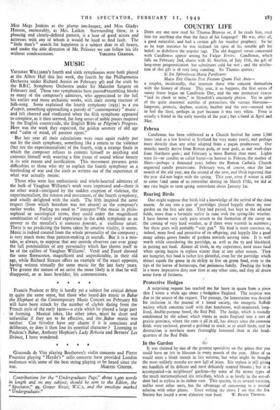MUSIC
VAUGHAN WILLIAMS'S fourth and sixth symphonies were both played at the Albert Hall this last week, the fourth by the Philharmonia Orchestra under Richard Austin on February 4th and the sixth by the B.B.C. Symphony Orchestra under Sir Malcolm Sargent on February 2nd. These two symphonies have provedottumbling blocks to many of the composer's admirers, who appreciated to the full his earlier and more archaistic works, with their strong tincture of folk-song. Some explained the fourth symphony (1935) as a jeu d'esprit, something approaching a parody of "contemporary" music ; and felt cheered and vindicated when the fifth symphony appeared to complete, as it then seemed, the long series of noble pieces inspired by the English countryside, the English -Bible or Pilgrim's Progress. Here was the work they expected, the golden serenity of old age and "calm of mind, all passion spent."
• But last year all their calculations were once again rudely put out by the sixth symphony, something like a return to the violence (but not the experimentalism) of the fourth, with a strange finale in which the composer refuses to commit himself to anything and contents himself with weaving a fine tissue of sound whose beauty is its sole reason and justification. This movement presents great difficulties to those who try to explain the fourth symphony as a foreboding of war and the sixth as written out of the experience of whaf war actually meant.
Those who were less enthusiastic and whole-hearted admirers of the bulk of Vaughan Williams's work were impressed and—there is no other word—intrigued by the sudden eruption of violence, the experimentalism the tension and movement, of the fourth symphony,
and wholly delighted with the sixth. The fifth inspired the same respect (from which boredom was not absent) as the composer's earlier works. Feeling no need to " interpret ksthe music in philo- sophical or sociological terms, they could enjoy the magnificent combination of vitality and experience in the sisth symphony as an answer to the moralist's si jeunesse pouvait, si vieillesse savait. There is no predicting the forms taken by creative vitality, it seems. Music is indeed created from the whole personality of the composer ; is very much more than pattern-making in sounds. But it is a mis- take, as always, to suppose that any outside observer can ever grasp the full potentialities of any personality which 4as shown itself to be of the calibre of Vaughan Williams'. Verdi and Faure showed the same florescence, magnificent and unpredictable, in their old age, while Richard Strauss offers an example of-'ffie exact opposite, having written virtually the same music for the last forty years. The greater the stature of an artist the more likely is it that he will disappoint, or at least bewilder, his commentators.
* * * *
Francis Poulenc at fifty is hardly yet a subject for critical debate in quite the same sense„ but those who heard-Ais music to Babar the Elephant at the Contemporary Music Concert on February 8th will have been struck by the number of clichés dating from the French style of the early 1920S—a style which le played a large part in forming. Musical jokes, like other jokes, must be short and unfamiliar if they are to be effective, and thet.Bahar music was neither. Can ,frivolity have any charm if it is conscious and deliberate, or does it then lose its essential character ? Listening to Poulenc's Babar, Anthony Hopkins's Lady Rohesia and Berners' Les Sirenes, I have wondered.
Gioconda de Vito playing Beethoven's violin concerto and Pierre Fournier playing " Haydn's " cello concerto have provided London audiences with some of the best string playing to be heard since the






































 Previous page
Previous page